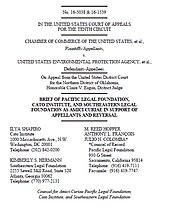Chamber of Commerce v. U.S. Environmental Protection Agency
Learn more about Cato’s Amicus Briefs Program.
Congress has granted the circuit courts the exclusive power to consolidate and hear certain challenges to the EPA Director’s actions under the Clean Water Act. Despite the fact that such review provisions are extraordinary tools that can impair individual rights when applied out of place, a panel of the U.S. Court of Appeals for the Sixth Circuit recently ruled that it had such exclusive jurisdiction over a number of cases challenging the EPA’s definition of “waters of the United States” (aka WOTUS, which essentially defines the scope of EPA authority under the Clean Water Act). The cases only ended up before the Sixth Circuit by chance, and yet that randomly selected appellate court based its reluctant, internally conflicting decision—which features three separate opinions—on a single Sixth Circuit precedent. Following that decision, a federal district court in Oklahoma dismissed the case Oklahoma and the Chamber of Commerce had filed there. Now the parties are appealing that dismissal to the Tenth Circuit. Cato, along with the Pacific Legal Foundation and Southeastern Legal Foundation, has filed a brief supporting the plaintiffs in that appeal. Each federal court that hears a case has an independent obligation to determine whether it can hear a particular case (what’s called “subject-matter jurisdiction”)—and circuit courts aren’t bound by the rulings of their sister circuits. Thus, the Tenth Circuit need not adhere to the Sixth Circuit panel’s determination of exclusive jurisdiction in these WOTUS cases, or to the Sixth Circuit precedent upon which that fractured holding was based. Furthermore, provisions modifying the right to judicial review are considered extraordinary tools and should be read narrowly. The provision that the Sixth Circuit held to encompass the WOTUS definition was written regarding challenges to the issuance or denial of permits. It is a stretch—and a big one at that—to extend that technical provision to challenges to the definition itself. Even the Supreme Court’s narrow extension of the provision to encompass actions that are “functionally similar” to permitting cannot justify this broad extension. Redefining WOTUS is in no way “functionally similar” to a permit denial; such broad readings impede the due-process rights of those challenging EPA actions. The Administrative Procedures Act creates a presumption of reviewability of agency action in the district courts. When constitutional questions are in issue, as here, the APA presumes the availability. The Sixth Circuit’s preclusive review would prevent as-applied claims from being brought during enforcement proceedings, denying due process to those affected by agency action. Finally, the D.C. Circuit issued a narrow interpretation of an identical preclusive-review provision under the Noise Control Act and acknowledged that “express preclusion of review at the enforcement stage creates a highly unusual and unnecessarily harsh restriction on the right to challenge the validity of a regulation to which one is subject.” Congress does not alter jurisdictional presumptions lightly, and neither should the courts.
